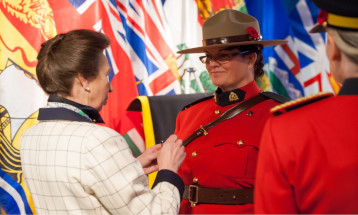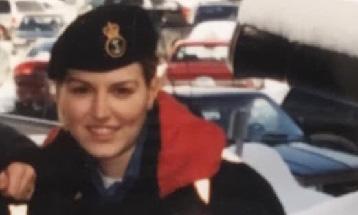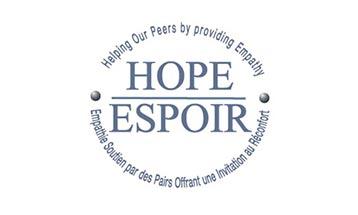When RCMP Sgt. (ret) Daphne McFee searched for information to help her children cope with her husband’s post-traumatic stress disorder (PTSD), she couldn’t find much.
So she decided to write a book to help them and others in similar situations.
“When PTSD enters a home, everyone is impacted by it,” McFee explains.
The almost 30-year RCMP Veteran was looking to help support her family as they navigated her husband Paul’s diagnosis of depression and severe, complex PTSD.
The diagnosis
RCMP Cpl. (ret) Paul Woods was suffering from memory loss, intrusive thoughts, nightmares, and hyper-vigilance, while isolating himself, and withdrawing from family. His worsening symptoms were confusing and concerning for everyone in the home, and left them all walking on eggshells.
When Woods was diagnosed with PTSD in 2009, McFee didn’t know where to turn. Counseling and support from Veterans Affairs Canada (VAC) helped them on their healing journey, McFee said.
Woods and McFee are both believers in peer support and early intervention. They say they feel that with the right support, PTSD symptoms can drastically improve.
“It takes time and effort on everyone’s part as well as a commitment by the one who is hurting,” McFee explains.
She says writing “It’s Not ’Cuz of Me” was a cathartic experience and a way for her to help other families.
“I know kids automatically put things on themselves,” she said.
“More often than not, they feel at fault when a parent’s mood changes. I felt that nobody was looking specifically at the kids’ side of things.”
Daphne was writing another children’s book at the time and pitched a package deal to the publishing house.

Daphne McFee at her book launch.
The book
In June 2017 McFee launched It’s Not ’Cuz of Me.
“So often children are left upset, with a lack of understanding and wondering what is going on. This story is for those children who have PTSD in their family, giving voice to their experiences, emotions and worries,” the back cover reads.
The illustrated book, written in rhyme to lighten a heavy subject, is meant to help kids understand the “hurt you can’t touch with your hand.”
“It’s really important that everyone understands that it’s not anyone’s fault, especially children.”
Life after diagnosis
Since his diagnosis, Woods has been working as a Peer Support Volunteer and Mentor with the RCMP support for Operational Stress Injury Social Support (OSISS) as well as with the Operational Stress Injuries (SOSI) programs in Ottawa. He helps other Veterans suffering from PTSD “get out of the hurt locker.”
He was in tears the first time he read the draft of his wife’s book.
“It can be a tough read, especially for the one living with PTSD. He felt so bad,” McFee explained. “It was a stark realization accompanied by unfounded self-blame.”
McFee’s background

Retired RCMP officers Daphne McFee and Paul Woods.
McFee joined the RCMP in Victoria, B.C. in 1986 at the age of 23. She worked with their protective detail, Personnel Security Unit, as well as threat assessment and investigations in national security, and in the professional standards policy section before retiring in 2015. She was told her writing skills helped contribute to her first promotion, which led her to become a supervisor in the international briefing unit at RCMP headquarters. “I’ve always loved writing,” she said. “The HQ Briefing Unit was a great place to hone my skills.”
Life with Paul
She met Woods while stationed in Ottawa. Both of them had been married before and each had two children when they remarried and began the hard work of growing and healing together. They now have one grandchild.
“It takes a lot to support a person living with PTSD, it’s not an easy journey,” she said. “I understand why a lot of spouses walk away..
“More families need to be educated on how they can support a person who suffers with trauma-related PTSD. This book is a piece of the puzzle to help put it all together.”
For more information on programs and services VAC provides to Veterans, visit Mental health and wellness - Veterans Affairs Canada



